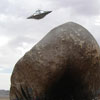A Sage And His Message
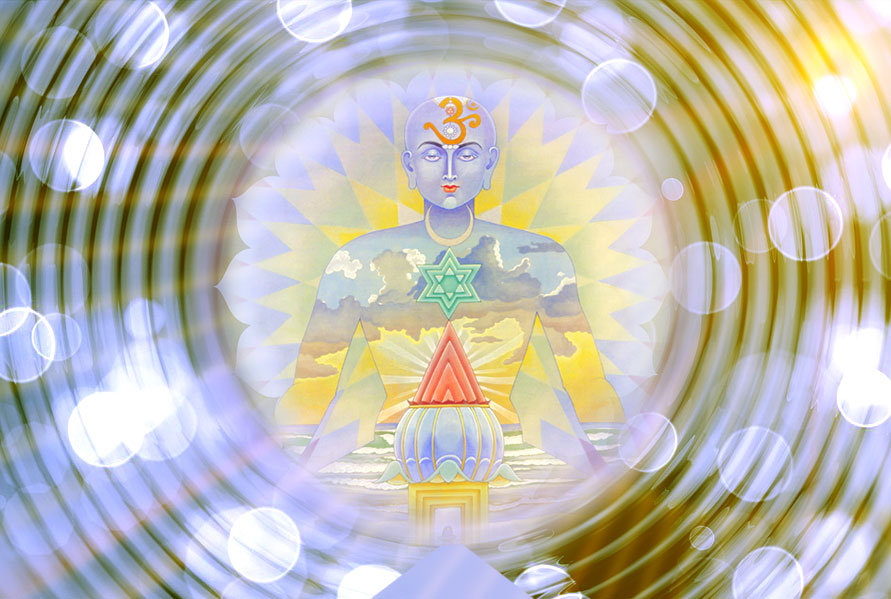 by Paul Brunton
by Paul Brunton
Paul Brunton (1898-1981) devoted his life to the practices, understanding, realization, and sharing of spiritual truths. During his public life he wrote eleven books and lived on every continent but Antarctica—and no doubt would have visited there, were a saint or sage known to be in residence! He also wrote daily thoughts in little notebooks, interviewed hundreds of teachers, fakirs, “fakers,” and saints around the globe. Here he recounts his meeting with one sage, Ramana Maharshi in India, on the meaning of “I”.
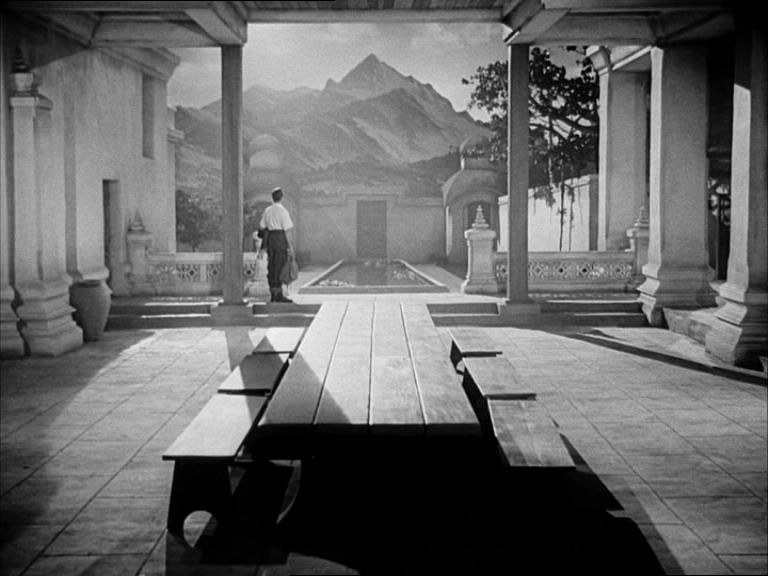
The midday meal is over. The sun unmercifully raises the afternoon temperature to a degree I have never before experienced. But then, we are now in a latitude not so far from the Equator. For once I am grateful that India is favoured with a climate which does not foster activity, because most of the people have disappeared into the shady groves to take a siesta, I can, therefore, approach the Maharshi in the way I prefer, without undue notice or fuss.
I enter the large hall and sit down near him. He half-reclines upon some white cushions placed on the divan. An attendant pulls steadily at the cord which operates the punka fan. The soft burr of the rope and the gentle swish of the fan as it moves through the sultry air sound pleasantly in my ears.
The Maharshi holds a folded manuscript book in his hands; he is writing something with extreme slowness. A few minutes after my entry he puts the book aside and calls a disciple. A few words pass between them in Tamil and the man tells me that his Master wishes to reiterate his regrets at my inability to partake of their food. He explains that they live a simple life and never having catered for Europeans before do not know what the latter eat. I thank the Maharshi, and say that I shall be glad to share their unspiced dishes with them; for the rest, I shall procure some food from the township. I add that I regard the question of diet as being far less important than the quest which has brought me to his hermitage.
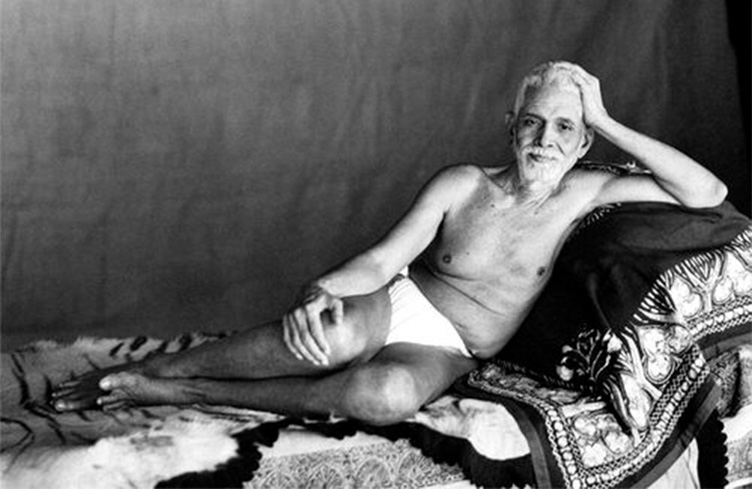 The Sage listens intently, his face calm, imperturbable and non-committal.
The Sage listens intently, his face calm, imperturbable and non-committal.
“It is a good object,” he comments at length.
This encourages me to enlarge upon the same theme.
“Master, I have studied our Western philosophies and sciences, lived and worked among the people of our crowded cities, tasted their pleasures and allowed myself to be caught up into their ambitions. Yet I have also gone into solitary places and wandered there amid the loneliness of deep thought. I have questioned the sages of the West: now I have turned my face towards the East. I seek more light.”
The Maharshi nods his head, as if to say, “Yes, I quite understand.”
“I have heard many opinions, listened to many theories. Intellectual proofs of one belief or another lie piled up all around me. I am tired of them, sceptical of anything which cannot be proved by personal experience. Forgive me for saying so, but I am not religious. Is there anything beyond man’s material existence? If so, how can I realize it for myself?”
The three or four devotees who are gathered around us stare in surprise. Have I offended the subtle etiquette of the hermitage by speaking so brusquely and boldly to their Master? I do not know: perhaps I do not care. The accumulated weight of many year’s desire has unexpectedly escaped my control and passed beyond my lips. If the Maharshi is the right kind of man, surely he will understand and brush aside mere lapses from convention.
He makes no verbal reply but appears to have dropped into some train of thought. Because there is nothing else to do and because my tongue has now been loosened, I address him for the third time:
“The wise men of the West, our scientists, are greatly honoured for their cleverness. Yet they have confessed that they can throw but little light upon the hidden truth behind life. It is said that there are some in your land who can give what our Western sages fail to reveal. Is this so? Can you assist me to experience enlightenment? Or is the search itself a mere delusion?”
I have now reached my conversational objective and decide to await the Maharshi’s response. He continues to stare thoughtfully at me. Perhaps he is pondering over my questions. Ten minutes pass in silence.
At last his lips open and he says gently:
“You say I. ‘I want to know.’ Tell me, who is that I?”
What does he mean? He has now cut across the services of the interpreter and speaks direct to me in English. Bewilderment creeps across my brain.
“I am afraid I do not understand your question,” I reply blankly.
“Is it not clear? Think again!”
I puzzle over his words once more. An idea suddenly flashes into my head. I point a finger towards myself and mention my name.
“And do you know him?”
“All my life!” I smile back at him.
“But that is only your body! Again I ask, ‘Who are you’?”
I cannot find a ready answer to this extraordinary query.
The Maharshi continues:
“Know first that I and then you shall know the truth.”
My mind hazes again. I am deeply puzzled. This bewilderment finds verbal expression. But the Maharshi has evidently reached the limit of his English, for he turns to the interpreter and the answer is slowly translated to me:
“There is only one thing to be done. Look into your own self. Do this in the right way and you shall find the answer to all your problems.”
It is a strange rejoinder. But I ask him:
“What must one do? What method can I pursue?”
“Through deep reflection on the nature of one’s self and through constant meditation, the light can be found.”
“The Yogis say that one must renounce this world and go off into secluded jungles or mountains, if one wishes to find truth. Such things can hardly be done in the West; our lives are so different. Do you agree with the Yogis?”
The Maharshi turns to a Brahm in disciple of courtly countenance. The latter translates his answer to me:
“The life of action need not be renounced. If you will meditate for an hour or two every day, you can then carry on with your duties. If you meditate in the right manner, then the current of mind induced will continue to flow even in the midst of your work. It is as though there were two ways of expressing the same idea; the same line which you take in meditation will be expressed in your activities.”
“What will be the result of doing that?”
“As you go on you will find that your attitude towards people, events and objects will gradually change. Your actions will tend to follow your meditations of their own accord.”
“Then you do not agree with the Yogis?” I try to pin him down.
But the Maharshi eludes a direct answer.
“A man should surrender the personal selfishness which binds him to this world. Giving up the false self is the true renunciation.”
“How is it possible to become selfless while leading a life of worldly activity?”
“There is no conflict between work and wisdom.”
“Do you mean that one can continue all the old activities in one’s profession, for instance, and at the same time get enlightenment?”
“Why not? But in that case one will not think that it is the old personality which is doing the work, because one’s consciousness will gradually become transferred until it is centred in That which is beyond the little self.”
“If a person is engaged in work, there will be little time left for him to meditate.”
The Maharshi seems quite unperturbed at my poser.
“Setting apart time for meditation is only for the merest spiritual novices,” he replies. “A man who is advancing will begin to enjoy the deeper beatitude, whether he is at work or not. While his hands are in society, he keeps his head cool in solitude.”
“Then you do not teach the way of Yoga?”
“The Yogi tries to drive his mind to the goal, as a cowherd drives a bull with a stick, but on this path the seeker coaxes the bull by holding out a handful of grass.”
“How is that done?”
“You have to ask yourself the question, ‘Who am I?’ This investigation will lead in the end to the discovery of something within you which is behind the mind. Solve that great problem, and you will solve all other problems thereby.”
There is a pause as I try to digest his answer. From the square-framed and barred hole in the wall which does duty as a window, as it does in so many Indian buildings, I obtain a fine view of the lower slopes of the sacred hill. Its strange outline is bathed in the early morning sunlight.
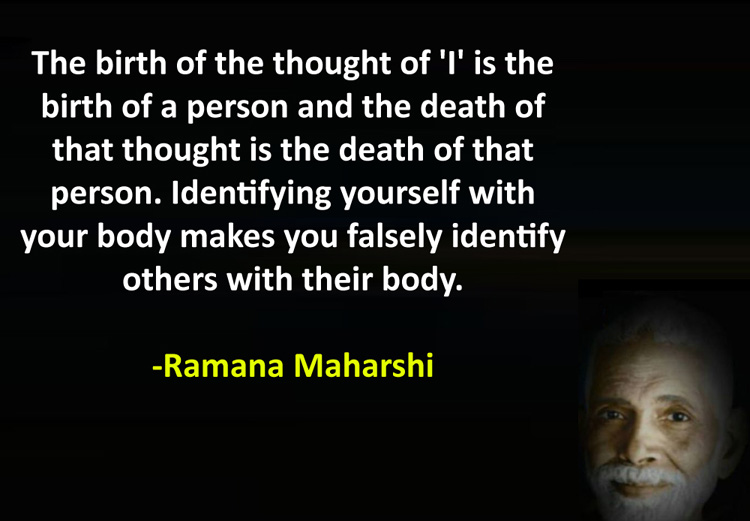 The Maharshi addresses me again:
The Maharshi addresses me again:
“Will it be clear if it is put in this way? All human beings are ever wanting happiness, untainted with sorrow. They want to grasp a happiness which will not come to an end. The instinct is a true one. But have you ever been struck by the fact that they love their own selves most?”
“Well?”
“Now relate that to the fact that they are ever desirous of attaining happiness through one means or another, [through drink or] [in original book] through religion, and you are provided with a clue to the real nature of man.”
“I fail to see……..”
The tone of his voice becomes higher.
“Man’s real nature is happiness. Happiness is inborn in the true self. His search for happiness is an unconscious search for his true self. The true self is imperishable; therefore when a man finds it, he finds a happiness which does not come to an end.”
“But the world is so unhappy?”
“Yes, but that is because the world is ignorant of its true self. All men, without exception, are consciously or unconsciously seeking for it.”
“Even the wicked, the brutal and the criminal?” I ask.
“Even they sin because they are trying to find the self’s happiness in every sin which they commit. This striving is instinctive in man, but they do not know that they are really seeking their true selves, and so they try these wicked ways first as a means to happiness. Of course, they are wrong ways, for a man’s acts are reflected back to him.”
“So we shall feel lasting happiness when we know this true self?”
The other nods his head.
A slanting ray of sunshine falls through the unglazed window upon the Maharshi’s face. There is serenity in that unruffled brow, there is contentment around that firm mouth, there is a shine-like peace in those lustrous eyes. His unlined countenance does not belie his revelatory words.
What does the Maharshi mean by these apparently simple sentences? The interpreter has conveyed their outward meaning to me in English, yes, but there is a deeper purport which he cannot convey. I know that I must discover that for myself. The Sage seems to speak, not as a philosopher, not as a pundit trying to explain his own doctrine, but rather out of the depth of his own heart. Are these words the marks of his own fortunate experience?
“What exactly is this self of which you speak? If what you say is true, then there must be another self in man.”
His lips curve in smile for a moment.
“Can a man be possessed of two identities, two selves?” he makes answer. “To understand this matter it is first necessary for a man to analyse himself. Because it has long been his habit to think as others think, he has never faced his ‘I’ in the true manner. He has not a correct picture of himself; he has too long identified himself with the body and the brain. Therefore, I tell you to pursue this enquiry, Who am I?”
He pauses to let these words soak into me. I listen eagerly to his next sentences.
“You ask me to describe this true self to you. What can be said? It is That out of which the sense of the personal ‘I’ arises, and into which it shall have to disappear.”
“Disappear?” I echo back. “How can one lose the feeling of one’s personality?”
“The first and foremost of all thoughts, the primeval thought in the mind of every man, is the thought ‘I’. It is only after the birth of this thought that any other thoughts can arise at all. It is only after the first personal pronoun ‘I’ has arisen in the mind that the personal pronoun ‘you’ can make its appearance. If you could mentally follow the ‘I’ thread until it leads you back to its source, you would discover that, just as it is the first thought to appear, so is it the last to disappear. This is a matter which can be experienced.”
“You mean that it is perfectly possible to conduct such a mental investigation into oneself?”
“Assuredly!”
It is possible to go to inwards until the last thought ‘I’ gradually vanishes.”
“What is left?” I query. “Will a man then become quite unconscious, or will he become an idiot?”
“Not so! on the contrary, he will attain that consciousness which is immortal, and he will become truly wise, when he has awakened to his true self, which is the real nature of man.”
“But surely the sense of ‘I’ must also pertain to that?” I persist.
“The sense of ‘I’ pertains to the person, the body and the brain,” replies the Maharshi calmly. “When a man knows his true self for the first time, something else arises from the depths of his being and takes possession of him. That something is behind the mind; it is infinite, divine, eternal. Some people call it the kingdom of heaven, others call it the soul, still others name it Nirvana, and we Hindus call it Liberation; you may give it what name you wish. When this happens, a man has not really lost himself; rather, he has found himself.”
As the last word falls from the interpreter’s lips there flashes across my mind those memorable words which were uttered by a wandering Teacher in Galilee, words which have puzzled to so many good persons: “Whosoever shall seek to save his life shall lose it: and whosoever shall lose his life shall preserve it.”
How strangely similar are the two sentences! Yet the Indian Sage has arrived at the thought in his own non-Christian way, through a psychological path which seems exceedingly difficult and appears unfamiliar.
The Maharshi speaks again, his words breaking into my thoughts.
“Unless and until a man embarks upon this quest of the true self, doubt and uncertainty will follow his footsteps throughout life. The greatest kings and statesmen try to rule others, when in their heart of hearts they know that they cannot rule themselves. Yet the greatest power is at the command of the man who has penetrated to his inmost depth. There are men of giant intellects who spend their lives gathering knowledge about many things. Ask these men if they have solved the mystery of man, if they have conquered themselves, and they will hang their heads in shame. What is the use of knowing about everything else when you do not yet know who you are? Men avoid this enquiry into the true self, but what else is there so worthy to be undertaken?”
“That is such a difficult, superhuman task” I comment.
The Sage gives an almost imperceptible shrug of his shoulders.
“The question of its possibility is a matter of one’s own experience. The difficulty is less real than you think.”
“For us, who are active, practical Westerners, such introspections . . . . . ?” I begin doubtfully and leave my sentence trailing in mid-air.
The Maharshi bends down to light a fresh joss stick, which will replace one whose red spark is dying out.
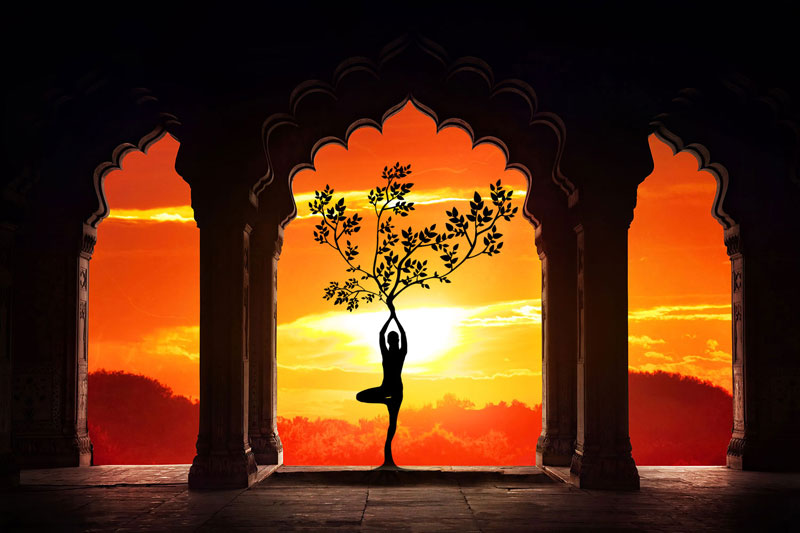 “The realization of truth is the same for both Indians and Europeans. Admittedly the way to it may be harder for those who are engrossed in worldly life, but even then one can and must conquer. The current induced during meditation can be kept up by habit, by practising to do so. Then one can perform his work and activities in that very current itself; there will be no break. Thus, too there will be no difference between meditation and external activities. If you meditate on this question, “Who am I?” – if you begin to perceive that neither the body nor the brain nor the desires are really you, then the very attitude of enquiry will eventually draw the answer to you out of the depths of your own being; it will come to you of its own accord as a deep realization.”
“The realization of truth is the same for both Indians and Europeans. Admittedly the way to it may be harder for those who are engrossed in worldly life, but even then one can and must conquer. The current induced during meditation can be kept up by habit, by practising to do so. Then one can perform his work and activities in that very current itself; there will be no break. Thus, too there will be no difference between meditation and external activities. If you meditate on this question, “Who am I?” – if you begin to perceive that neither the body nor the brain nor the desires are really you, then the very attitude of enquiry will eventually draw the answer to you out of the depths of your own being; it will come to you of its own accord as a deep realization.”
Again I ponder his words.
“Know the real self,” he continues “and then the truth will shine forth within your heart like sunshine. The mind will become untroubled and real happiness will flood it; for happiness and the true self are identical. You will have no more doubts once you attain this self-awareness.”
He turns his head and fixes his gaze at the far end of the hall. I know then that he has reached his conversational limit. Thus ends our last talk and I congratulate myself that I have drawn him out of the shell of taciturnity before my departure.
I leave him and wander away to a quiet spot in the jungle, where I spend most of the day among my notes and books. When dusk falls I return to the hall, for within an hour or two a pony carriage or a bullock-cart will arrive to bear me away from the hermitage.
Excerpt from A Search In Secret India
Posted in Other Topics, Spiritualitywith comments disabled.




